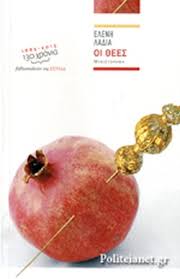
Memory is the core. Historical memory, lived memory and collective experience, biological memory and its loss. Memory is also the web of narration. It spreads in the form of a short treatise, a collective narrative transmitted by the elder women, personal thoughts recorded as a diary. Thus, every evolution in the flow of the narrative takes on this triple quality.
The narrator, as she takes care of her mother who is gradually sinking into dementia, reflects on the family past, which is transformed into a historical past of a country. At the same time, she takes the ancient path to Eleusis, where the mother becomes Demeter and the daughter Persephone. It meets antiquity through a ritual initiation look. The story has many shirts like a snake and the narrator unfolds them and places them in the pages of the book. In this way, she finds modus to dig up the many faces of time and bring them to light.
Reality does not need imagination in her narration, because it is reality itself that contains imagination. The faces of mother and daughter are confused, mother becomes daughter and vice versa. They know how to look at the sky, because they feed on the earth.
Eleni Ladia finally allows us to feel intimacy, this feeling that we made a new friend. It welcomes us to a world with humanity, the one we seek so much and find so slightly. She hosts us in her own world and lets us understand that it is dreamy and heavenly to be an unclad human being, as you are when the earth itself gave birth to you, without trimmings. She emits light and warms us with her light.
Anastasia Karavasileiou


